Related Research Articles
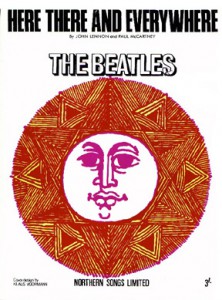
"Here, There and Everywhere" is a song by the English rock band the Beatles from their 1966 album Revolver. A love ballad, it was written by Paul McCartney and credited to Lennon–McCartney. McCartney includes it among his personal favourites of the songs he has written. In 2000, Mojo ranked it 4th in the magazine's list of the greatest songs of all time.
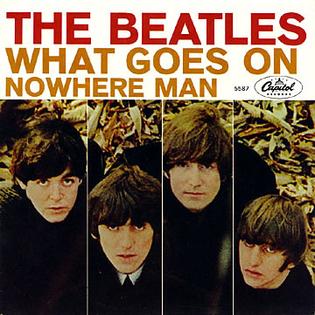
"What Goes On" is a song by the English rock band the Beatles, featured as the eighth track on their 1965 album Rubber Soul. The song was later released as the B-side of the US single "Nowhere Man", and then as the tenth track on the North America-only album Yesterday and Today. It is the only song by the band credited to Lennon–McCartney–Starkey and the only song on Rubber Soul that features Ringo Starr on lead vocals. The song reached number 81 on the US Billboard Hot 100 in 1966.

"Think for Yourself" is a song by the English rock band the Beatles from their 1965 album Rubber Soul. It was written by George Harrison, the band's lead guitarist, and, together with "If I Needed Someone", marked the start of his emergence as a songwriter beside John Lennon and Paul McCartney. The song's lyrics advocate independent thinking and reflect the Beatles' move towards more sophisticated concepts in their writing at this stage of their career. The song has invited interpretation as both a political statement and a love song, as Harrison dismisses a lover or friend in a tone that some commentators liken to Bob Dylan's 1965 single "Positively 4th Street". Among musicologists, the composition has been recognised as adventurous in the degree of tonal ambiguity it employs across parallel major and minor keys and through its suggestion of multiple musical modes.
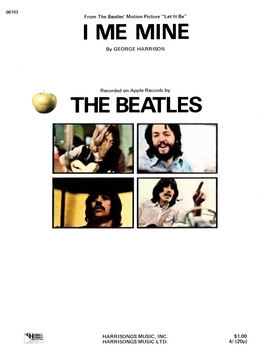
"I Me Mine" is a song by the English rock band the Beatles from their 1970 album Let It Be. Written by George Harrison, it was the last new track recorded by the band before their break-up in April 1970. The song originated from their January 1969 rehearsals at Twickenham Film Studios when they were considering making a return to live performance. Written at a time of acrimony within the group, the lyrics lament humankind's propensity for self-centredness and serve as a comment on the discord that led to Harrison temporarily leaving the Beatles. The musical arrangement alternates between waltz-time verses and choruses played in the hard rock style.

"Savoy Truffle" is a song by the English rock band the Beatles from their 1968 album The Beatles. The song was written by George Harrison and inspired by his friend Eric Clapton's fondness for chocolate. The lyrics list the various flavours offered in Mackintosh's Good News chocolates and serve as a warning to Clapton about the detrimental effect that his gorging would have on his teeth. Along with Clapton's guest appearance on the White Album track "While My Guitar Gently Weeps" and Harrison reciprocating on Cream's "Badge", it is one of several songs that mark the start of a long-lasting musical association between the two guitarists.
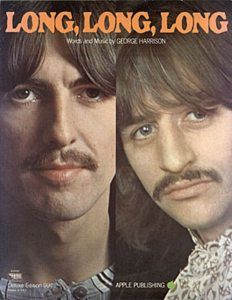
"Long, Long, Long" is a song by the English rock band the Beatles from their 1968 album The Beatles. It was written by George Harrison, the group's lead guitarist, while he and his bandmates were attending Maharishi Mahesh Yogi's Transcendental Meditation course in Rishikesh, India, in early 1968. Although Harrison later stated that he was addressing God in the lyrics, it is the first of his compositions that invites interpretation as both a standard love song and a paean to his deity.

"I Want to Tell You" is a song by the English rock band the Beatles from their 1966 album Revolver. It was written and sung by George Harrison, the band's lead guitarist. After "Taxman" and "Love You To", it was the third Harrison composition recorded for Revolver. Its inclusion on the LP marked the first time that he was allocated more than two songs on a Beatles album, a reflection of his continued growth as a songwriter beside John Lennon and Paul McCartney.

"The Night Before" is a song by the English rock band the Beatles from their 1965 film Help! and soundtrack album of the same name. It was written primarily by Paul McCartney and credited to the Lennon–McCartney partnership. Described as a pop rock or rock and roll song, its lyrics reflect on the singer's last night with his lover before being abandoned.

"Tell Me What You See" is a song by the English rock band the Beatles that first appeared in 1965 on their album Help! in the United Kingdom and on Beatles VI in the United States. The song is credited to Lennon–McCartney but mainly written by Paul McCartney. Regarding the song's authorship, McCartney said, "I seem to remember it as mine. I would claim it as a 60–40 but it might have been totally me." John Lennon said, in his interviews with Playboy (1980) and Hit Parader (1972), that "Tell Me What You See" was written completely by McCartney.
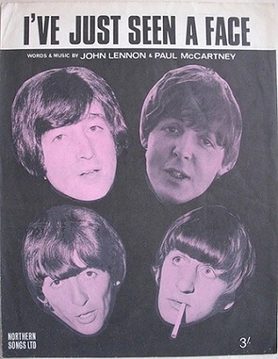
"I've Just Seen a Face" is a song by the English rock band the Beatles. It was released in August 1965 on their album Help!, except in North America, where it appeared as the opening track on the December 1965 release Rubber Soul. Written and sung by Paul McCartney, the song is credited to the Lennon–McCartney partnership. The song is a cheerful love ballad, its lyrics discussing a love at first sight while conveying an adrenaline rush the singer experiences that makes him both enthusiastic and inarticulate.

"I'll Follow the Sun" is a song by the English rock band the Beatles. It is a ballad written and sung by Paul McCartney and credited to Lennon–McCartney. It was released in 1964 on the Beatles for Sale album in the United Kingdom and on Beatles '65 in the United States. The band played the song on the BBC program Top Gear, and the track was released on On Air – Live at the BBC Volume 2 in 2013.
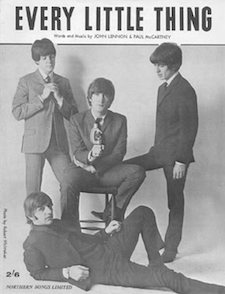
"Every Little Thing" is a song by the English rock band the Beatles from their album Beatles for Sale, issued in the UK in December 1964. Credited to Lennon–McCartney, it was written by Paul McCartney. Capitol Records first issued the song in the US on Beatles VI in June 1965. The track is an early example of the Beatles' use of non-rock instrumentation on a recording, through the addition of timpani drum over the choruses.
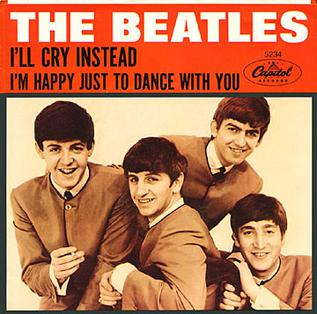
"I'll Cry Instead" is a song written by John Lennon, and recorded by the English rock band the Beatles for their third studio album, A Hard Day's Night (1964), a part-studio and part-soundtrack album to their film of the same name (1964). The song was released as a single in the US and later appeared on the album Something New in the US.

"Please Mr. Postman" is a song written by Georgia Dobbins, William Garrett, Freddie Gorman, Brian Holland and Robert Bateman. It is the debut single by the Marvelettes for the Tamla (Motown) label, notable as the first Motown song to reach the number-one position on the Billboard Hot 100 pop singles chart. The single achieved this position in late 1961; it hit number one on the R&B chart as well. "Please Mr. Postman" became a number-one hit again in early 1975 when The Carpenters' cover of the song reached the top position of the Billboard Hot 100. "Please Mr. Postman" has been covered several times, including by the British rock group the Beatles in 1963. The 2017 song "Feel It Still" by Portugal. The Man draws on "Please Mr. Postman" and includes a credit for Brian Holland.
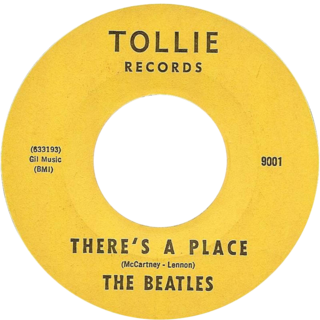
"There's a Place" is a song by the English rock band the Beatles from their debut album, Please Please Me, released in March 1963. It was written primarily by John Lennon and credited to McCartney–Lennon. In the United States, the song was released in July 1963 on the group's first US LP, Introducing... The Beatles, later reissued in January 1964 as Beatlemania surged there. It was also issued as a non-album single in the US, in March 1964, as the B-side to "Twist and Shout", reaching number 74 in the Billboard Hot 100.
"Hey Bulldog" is a song by the English rock band the Beatles released on their 1969 soundtrack album Yellow Submarine. Credited to Lennon–McCartney, but written primarily by John Lennon, it was finished in the recording studio by both Lennon and Paul McCartney. The song was recorded during the filming of the "Lady Madonna" promotional film, and, with "Lady Madonna", is one of the few Beatles songs based on a piano riff.
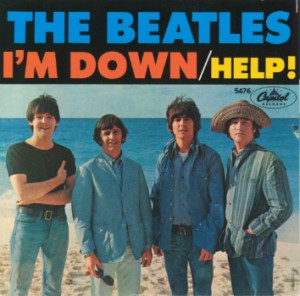
"I'm Down" is a song by the English rock band the Beatles, written by Paul McCartney and credited to Lennon–McCartney. It was released on a non-album single as the B-side to "Help!" in July 1965. The song originated in McCartney's attempt to write a song in the style of Little Richard, whose song "Long Tall Sally" the band regularly covered.
"She's a Woman" is a song by the English rock band the Beatles, written primarily by Paul McCartney and credited to Lennon–McCartney. It was released on a non-album single in November 1964 as the B-side to "I Feel Fine", except in North America, where it also appeared on the album Beatles '65, released in December 1964. Though it was the B-side, it charted in the US, reaching number four on the Billboard Hot 100 and number eight on the Cash Box Top 100. The song originated in McCartney's attempt to write a song in the style of Little Richard. The lyrics include the first reference to drugs in a Beatles song, with the line "turn(s) me on" referring to marijuana.

"Good Night" is a song by the English rock band the Beatles from their 1968 double album The Beatles. It was written by John Lennon and credited to Lennon–McCartney. The lead vocalist on the recording is Ringo Starr, who was the only Beatle to appear on the track. The music was provided by an orchestra arranged and conducted by George Martin. Written for Lennon's five-year-old son Julian, "Good Night" is the final song on the White Album.
Walter Everett is a music theorist specializing in popular music who teaches at the University of Michigan.
References
- ↑ Stone, Nick. "Deconstructing the Beatles: Alan Pollack's 'Notes On...' Series". Learning Musician. Retrieved 18 October 2010.[ dead link ]
- ↑ Burns, Gary (2009). "Beatles News: Product line extensions and the rock canon". In Womack, Kenneth (ed.). The Cambridge Companion to the Beatles. Cambridge, UK: Cambridge University Press. p. 228. ISBN 978-0-521-68976-2.
- ↑ Everett, Walter (2001). The Beatles as Musicians: The Quarry Men Through Rubber Soul . New York, NY: Oxford University Press. pp. xvi, 283, 286, 399. ISBN 0-19-514105-9.
- ↑ Womack, Kenneth (2014). The Beatles Encyclopedia: Everything Fab Four. Santa Barbara, CA: ABC-CLIO. p. 1081. ISBN 978-0-313-39171-2.